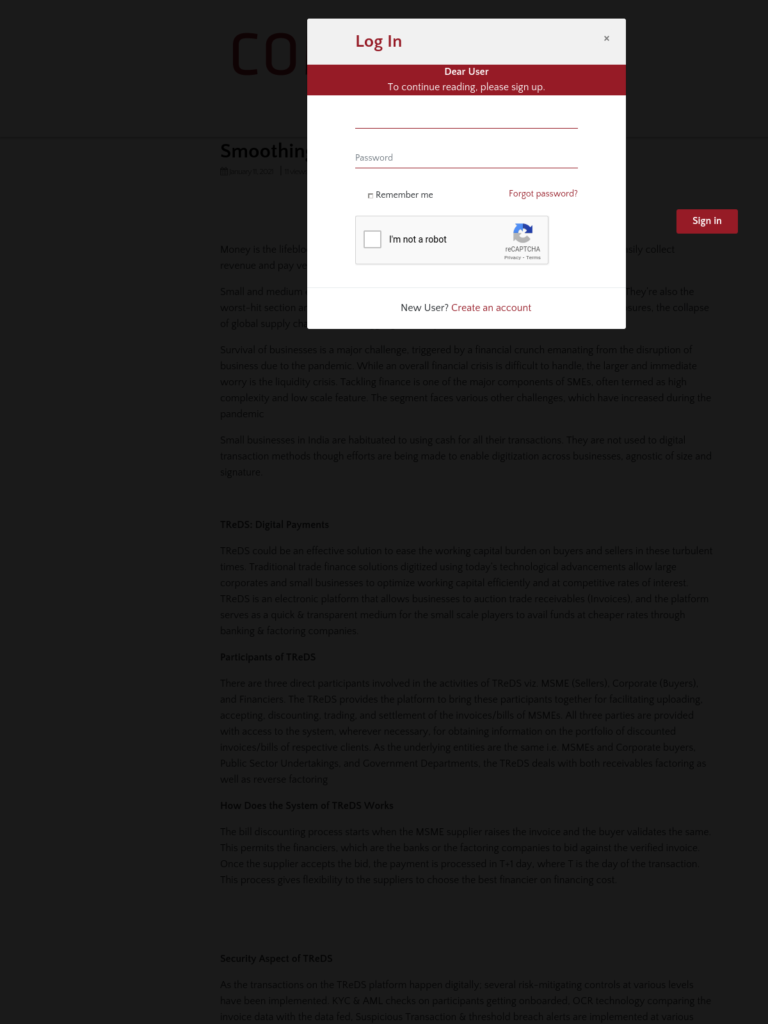Smoothing B2B Payments by TReDS
Blog: NASSCOM Official Blog
Smoothing B2B Payments by TReDS
Money is the lifeblood of businesses, and nothing thwarts growth plans like the inability to easily collect revenue and pay vendors.
Small and medium enterprises (SMEs) are a principal driving force of our nation’s economy. They’re also the worst-hit section amidst the pandemic. The past few months have seen mass layoffs and closures, the collapse of global supply chains, and a struggling economy.
Survival of businesses is a major challenge, triggered by a financial crunch emanating from the disruption of business due to the pandemic. While an overall financial crisis is difficult to handle, the larger and immediate worry is the liquidity crisis. Tackling finance is one of the major components of SMEs, often termed as high complexity and low scale feature. The segment faces various other challenges, which have increased during the pandemic
Small businesses in India are habituated to using cash for all their transactions. They are not used to digital transaction methods though efforts are being made to enable digitization across businesses, agnostic of size and signature.
TReDS: Digital Payments
TReDS could be an effective solution to ease the working capital burden on buyers and sellers in these turbulent times. Traditional trade finance solutions digitized using today’s technological advancements allow large corporates and small businesses to optimize working capital efficiently and at competitive rates of interest. TReDS is an electronic platform that allows businesses to auction trade receivables (Invoices), and the platform serves as a quick & transparent medium for the small scale players to avail funds at cheaper rates through banking & factoring companies.
Participants of TReDS
There are three direct participants involved in the activities of TReDS viz. MSME (Sellers), Corporate (Buyers), and Financiers. The TReDS provides the platform to bring these participants together for facilitating uploading, accepting, discounting, trading, and settlement of the invoices/bills of MSMEs. All three parties are provided with access to the system, wherever necessary, for obtaining information on the portfolio of discounted invoices/bills of respective clients. As the underlying entities are the same i.e. MSMEs and Corporate buyers, Public Sector Undertakings, and Government Departments, the TReDS deals with both receivables factoring as well as reverse factoring
How Does the System of TReDS Works
The bill discounting process starts when the MSME supplier raises the invoice and the buyer validates the same. This permits the financiers, which are the banks or the factoring companies to bid against the verified invoice. Once the supplier accepts the bid, the payment is processed in T+1 day, where T is the day of the transaction. This process gives flexibility to the suppliers to choose the best financier on financing cost.
Security Aspect of TReDS
As the transactions on the TReDS platform happen digitally; several risk-mitigating controls at various levels have been implemented. KYC & AML checks on participants getting onboarded, OCR technology comparing the invoice data with the data fed, Suspicious Transaction & threshold breach alerts are implemented at various places to monitor the transaction behavior vis-à-vis participant’s profile and past transaction history. At each stage, all participants are kept informed of a transaction through various notifications and online dashboards. To enhance security, digital signature has been made mandatory by the government to initiate any transaction on the platform.
Benefits of TReDS:
- Unified electronic platform for Sellers, Buyers & Financiers.
- Best Discount rate as multiple financiers participate in auction
- Liquidity improves as there is easy/quick access of funds
- Allows MSMEs to post their receivables on the system and get them financed.
- Security of digital platform for confidentiality of information
- Corporates enjoy savings on procurement cost through improved negotiation of financing term for its vendors.
- Corporates save on the financing cost by extending their credit period and augmenting their payment cycle.
- Financiers, on the other hand have an opportunity to build PSL asset portfolio.
- TReDS can be integrated with the ERP systems and avoid manual processes
Future Forward for TReDS
Experts feel that continual government support and awareness can go a long way in countering the challenges being experienced. The government on its part has taken several initiatives recently to boost the TReDS exchanges. All advances under TReDS are categorized as Priority Sector Lending for banks who participate, thus widening eligibility of MSMEs. In his 12 point agenda to spur growth and boost revival of the MSME sector last year, Prime Minister Narendra Modi had also made it mandatory for companies with a turnover of Rs 500 crore and above to join TReDS so that cash flow does not pose a deterrent to this sector.
The enthusiasm seems to have caught on going by the increasing numbers of players coming on board every other day on these platforms. “The TReDS program is modernizing and bringing up India. A huge shift has happened, the volume of transactions on TReDS platforms as well as the volume of onboarding of large corporates reflects their confidence in the system. Making it mandatory will only help in changing the style and the attitude.”
The post Smoothing B2B Payments by TReDS appeared first on NASSCOM Community |The Official Community of Indian IT Industry.
Leave a Comment
You must be logged in to post a comment.








